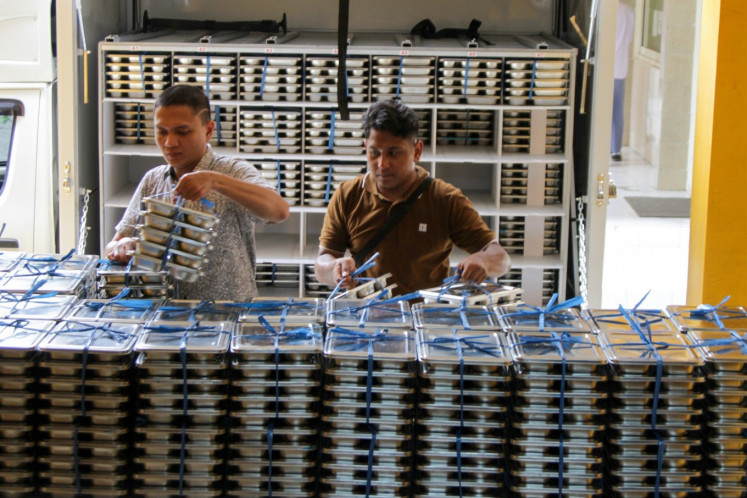Parents support plan to limit gadget use
Parents who are worried about their children’s acute dependence on gadgets have expressed positive feedback over the government’s plan to impose a policy limiting the use of gadgets among children
Change text size
Gift Premium Articles
to Anyone

P
arents who are worried about their children’s acute dependence on gadgets have expressed positive feedback over the government’s plan to impose a policy limiting the use of gadgets among children.
The government has planned to issue a regulation limiting the use of the internet and gadgets by children after recent cases of rampant pornography and prostitution with children as victims.
Ratih Komala, 33, said although she had yet to learn the specifics of the regulation, she supports the plan because her3-year-old toddler has become addicted to using technology.
“It sounds like a good plan, but how does it work?” said the mother of three. “For parents, sometimes there are feelings of relief when our kids stay at home and remain pacified, but it can also be dangerous for them if they are too addicted to them [gadgets] and forget how to socialize with their friends,” she said.
Ratih, who lives in Bandung, West Java, said that her 3-year-old, the youngest among the three, can spend more than two consecutive hours playing a racing game on her phone.
“Although he doesn’t really understand the rules, he just loves seeing moving cars,” said Ratih, who works as a midwife.
Ratih added that his son learned how to operate gadgets from his oldest brother, whose addiction had started when he was a toddler.
The younger boy’s use of the device had gradually escalated to the point where he would cry out loud if she forcefully took the gadgets from him.
She said her other two children, whose ages are 9 and 5 respectively, are always glued to the games on their mobile phones.
Women’s Empowerment and Child Protection Minister Yohanna Yambise said on Wednesday the addiction of children to gadgets and the internet has reached a worrying stage, prompting her to create a government regulation (PP) to limit children’s access to technology.
The ministry’s child protection deputy, Wahyu Hartomo, told The Jakarta Post that one point included in the regulation is to encourage regional governments and regional education agencies to regulate the use of gadgets in their respective areas.
“One of the points is to regulate parents who wish to buy mobile phones for their children. If their child is still in junior high school, their mobile phones should be the kind that only have the function to send messages and call without features that allow access to the internet, which exposes them to harmful content,” he said.
Parents who fail to comply with this law, once enacted, will be punished.
“We have yet to determine the form of punishment — whether it would be in the form of social sanction or something else,” he said.
For Ifa Ruhina, 40, mother of a 4-year-old toddler, the planned regulation would cure her child’s addiction to playing with her tablet.
“I agree with the plan, although I realize that the success of the policy depends on parents. The previous policy to block pornographic websites also works well, even though many people can still find ways to access them,” she added.
She said her son started to habituate to gadgets since he was 9-months-old, as she often involved him in taking selfies and taught him how to open YouTube.
“He gets more addicted to it now and often cries when the internet connection is slow, preventing him from seeing the videos he likes,” said Ifa, who lives in Pasuruan, East Java.
She added her son had rarely played with his friends and once refused to mingle when he was enrolled to a play group.
“I am afraid that his addiction to gadgets has hampered his social development,” she said. (fac)









